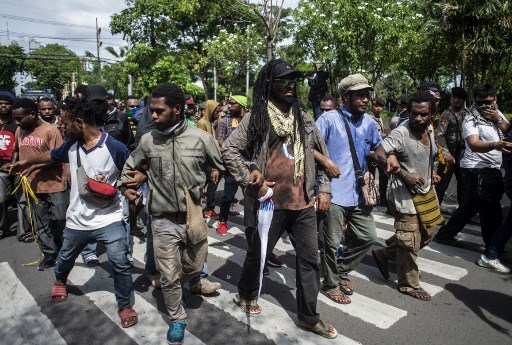In addition to the so-called 212 Grand Reunion in Jakarta, yesterday also saw rallies in a number of Indonesian cities by activists commemorating the 57th anniversary of Papua declaring itself an independent nation. The protests led to hundreds of demonstrators being arrested and violent clashes with nationalist counter-protesters in some locations.
One of the biggest rallies took place in the East Java capital of Surabaya, where hundreds of demonstrators from the Papuan Student Alliance (AMP) came to demonstrate. However, their numbers were diminished after some 233 activists were detained by authorities late on Saturday. East Java police spokesman Frans Barung Mangera confirmed to AFP that one Australian national, Ronda Amy Harman, was among those secured by police.
https://www.facebook.com/photo.php?fbid=2211922275485218&set=a.401715116505952&type=3
Despite that, reports say that Sunday’s demonstration started peacefully, with orators calling for an end to discrimination against their cause and protections for their right to free speech.
But the activists were blocked and eventually clashed with a group of about 200 counter-protesters from nationalist groups such as Pemuda Pancasila that attempted to intimidate the protesters with verbal insults that escalated into violence, as seen in this video from BBC Indonesia.
Seventeen people were reportedly injured in the clashes and by the Surabaya Police and the city’s Civil Service Police (Satpol PP), who had to forcibly separate and disperse both groups.
However, that wasn’t the end of tensions in Surabaya. By Sunday night, a Papuan student dormitory on Jalan Kalasan, where many of the activists had been staying, was surrounded by a mob, mostly consisting of members of the same counter-protest groups that had clashed with them earlier in the day, as well as police attempting to keep the peace.
Eventually, the police decided to force those activists who didn’t live in the dorms to leave and return to their places of residence. Two buses were provided to shuttle around 180 people away the building. Police told the media that it was necessary to maintain the peace in Surabaya.
An AMP representative told the media on Monday morning that the 233 detained in Surabaya had already been released and allowed to return home.
Including those in Surabaya, a total of 537 people were arrested for their involvement in the protests. Others were arrested in Kupang, Ternate, Ambon, Manado, Makassar, Jayapura, Asmat and Waropen.
Papua declared itself an independent nation on December 1, 1961, but neighboring Indonesia took control of the region by force in 1963. It officially annexed Papua in 1969 with a UN-backed vote, widely seen as a sham.
Rights groups have blasted authorities for the mass detentions, saying it was an assault on Papuans’ right to freedom of expression and assembly.
“These people did nothing but peacefully attend public events,” Amnesty International Indonesia’s executive director Usman Hamid said in a statement.
“These arbitrary arrests add to the long list of acts of harassment, intimidation and arrests faced by Papuans.”
Jakarta keeps a tight grip on resource-rich Papua, which has been the scene of a low-level independence insurgency since the late Sixties.
Some of the violence has been centered on protests against a huge gold and copper mine owned by US-based firm Freeport McMoRan — a frequent flashpoint in the local struggle for independence and a bigger share of the region’s rich resources.
- With additional reporting by AFP





